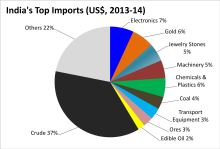| This article needs additional citations for verification. Please help improve this article by adding citations to reliable sources. Unsourced material may be challenged and removed. Find sources: "Commodity value" – news · newspapers · books · scholar · JSTOR (January 2017) (Learn how and when to remove this message) |

In the field of economics, the commodity value of a good is its free market under optimal use conditions. In a free market, the commodity value of a good will be reflected by its price.
Example
If an acre of land can yield a net of 100 dollars loss by lying fallow, 50 dollars gain by being planted with corn, and 100 dollars gain by being planted with wheat, then that acre's commodity value is 100 dollars; the farmer is assumed to put his land to best use. The price of a commodity fluctuates around its commodity value.
Currency
A commodity value expressed as a price is determined by historical, social and cultural aspects of production and distribution. Karl Marx described price as the money-name for the labour realised in a commodity. A commodity value is dependent on its utility.
Because money becomes valuable not due to its substance, that is, its commodity value, but rather because of its performance, currencies tend to become token.
See also
References
- Wu, Bingxin (2011). Consumption and Management: New Discovery and Applications. Elsevier. ISBN 9781908818072.
- Sheumaker, Helen; Shirley Teresa Wajda (2008). Material Culture in America: Understanding Everyday Life. ABC-CLIO. p. 299. ISBN 9781576076477. Retrieved 3 January 2017.
- Marx, Karl (2007). Capital: A Critique of Political Economy - The Process of Capitalist Production. Cosimo, Inc. p. 114. ISBN 9781605200064. Retrieved 3 January 2017.
- Anderson, B. M. (1922). The Value of Money. Ludwig von Mises Institute. p. 15. ISBN 9781610162777. Retrieved 3 January 2017.
- Schoenberger, Erica (2014). Nature, Choice and Social Power. Routledge. p. 98. ISBN 978-1135051587. Retrieved 4 January 2017.
This economic term article is a stub. You can help Misplaced Pages by expanding it. |